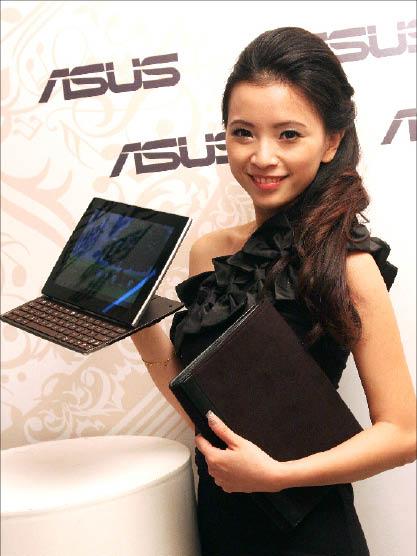Asustek Computer Inc (華碩), the world’s No. 5 PC brand, yesterday said its upcoming UX series Ultrabook platform would fail to carry price tags of less than US$1,000, as claimed by Intel Corp.
“Unless we use Intel Core i3 chips [the Ultrabooks will not be less than US$1,000]. The price tags will have to go beyond US$1,000 if [more advanced] i5 and i7 chips go into the notebooks,” a person familiar with UX development said.
The UX series will mainly use i5 and i7 to boost performance, he said.

Photo Courtsey of ASUS
The i5 and i7 chips, which are more expensive, plus the operating system and solid-state hard drives would account for about 50 percent of the cost of the ultraslim notebooks, thus driving up the price of the UX series to between US$1,000 and US$2,000, he said.
The UX series, showcased by Asustek at the Computex tech trade fair in late May, aims to rival MacBook Air from Apple Inc.
The UX series has two models — one is 11.6 inches and weighs 1.1kg, while the other is 13.3 inches and weighs 1.3kg.
Intel touted the Ultrabook platform at Computex, saying it would make notebooks thinner, lighter and more affordable, with price tags of less than US$1,000, while adding that battery life would last longer than 10 hours.
Asustek is likely to be the first vendor to debut Ultrabooks. The person said it was on track for a debut in Taiwan in late September.
Other companies, such as Acer Inc (宏碁) and Hewlett-Packard Co, reportedly plan to roll out Ultrabooks by the end of the year.
The person’s comments echoed those of Asustek general sales manager Kevin Lin (林福能), who said earlier this month that the price tags for the UX series would go above US$1,000 based on various specs.
Daiwa Capital Market’s analyst Calvin Huang (黃文堯) said on July 13 that Intel was merely cutting prices for its low-voltage processors to help thin and light notebooks make a comeback.
However, in Huang’s view, Intel’s help might not be enough because to make an Ultrabook, other more advanced and expensive components — such as ultrathin panels, solid-state hard drives, metal casings, high-density interconnect and polymer batteries — are required to make it comparable to the MacBook Air.
Separately, Fitch Ratings yesterday upgraded Asustek’s long-term foreign currency issuer default rating to “BBB” from “BB+” and its national long-term rating to “A+(twn)” from “A-(twn),” with a stable outlook.
“The upgrade reflects Asustek’s increase in market share and significant improvements to its -financial profile. The company’s focus on quality and innovation is gradually translating into market share gains and growing customer loyalty,” Fitch analyst Kevin Chang (張崇人) said in an e-mailed statement.
Asustek, which pioneered the mini-size notebook PC — also known as a netbook — market in 2009, is also the world’s largest provider of PC motherboards and graphic cards.

Sweeping policy changes under US Secretary of Health and Human Services Robert F. Kennedy Jr are having a chilling effect on vaccine makers as anti-vaccine rhetoric has turned into concrete changes in inoculation schedules and recommendations, investors and executives said. The administration of US President Donald Trump has in the past year upended vaccine recommendations, with the country last month ending its longstanding guidance that all children receive inoculations against flu, hepatitis A and other diseases. The unprecedented changes have led to diminished vaccine usage, hurt the investment case for some biotechs, and created a drag that would likely dent revenues and

Global semiconductor stocks advanced yesterday, as comments by Nvidia Corp chief executive officer Jensen Huang (黃仁勳) at Davos, Switzerland, helped reinforce investor enthusiasm for artificial intelligence (AI). Samsung Electronics Co gained as much as 5 percent to an all-time high, helping drive South Korea’s benchmark KOSPI above 5,000 for the first time. That came after the Philadelphia Semiconductor Index rose more than 3 percent to a fresh record on Wednesday, with a boost from Nvidia. The gains came amid broad risk-on trade after US President Donald Trump withdrew his threat of tariffs on some European nations over backing for Greenland. Huang further

CULPRITS: Factors that affected the slip included falling global crude oil prices, wait-and-see consumer attitudes due to US tariffs and a different Lunar New Year holiday schedule Taiwan’s retail sales ended a nine-year growth streak last year, slipping 0.2 percent from a year earlier as uncertainty over US tariff policies affected demand for durable goods, data released on Friday by the Ministry of Economic Affairs showed. Last year’s retail sales totaled NT$4.84 trillion (US$153.27 billion), down about NT$9.5 billion, or 0.2 percent, from 2024. Despite the decline, the figure was still the second-highest annual sales total on record. Ministry statistics department deputy head Chen Yu-fang (陳玉芳) said sales of cars, motorcycles and related products, which accounted for 17.4 percent of total retail rales last year, fell NT$68.1 billion, or

HSBC Bank Taiwan Ltd (匯豐台灣商銀) and the Taiwan High Prosecutors Office recently signed a memorandum of understanding (MOU) to enhance cooperation on the suspicious transaction analysis mechanism. This landmark agreement makes HSBC the first foreign bank in Taiwan to establish such a partnership with the High Prosecutors Office, underscoring its commitment to active anti-fraud initiatives, financial inclusion, and the “Treating Customers Fairly” principle. Through this deep public-private collaboration, both parties aim to co-create a secure financial ecosystem via early warning detection and precise fraud prevention technologies. At the signing ceremony, HSBC Taiwan CEO and head of banking Adam Chen (陳志堅)